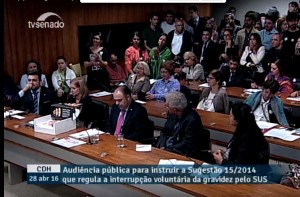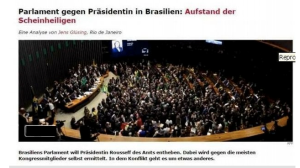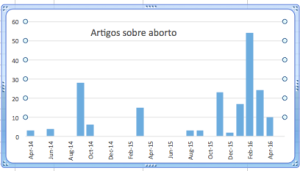by Sonia Corrêa*
Since early 2015, SPW has been linking developments at play in the abortion debate to the on-going Brazilian political and economic crisis. On April 17th, 2016, this crisis reached a point of culmination when the House of Representatives voted for and approved the admissibility of the impeachment of President Dilma Rousseff.
The grotesque imagery of the House Plenary session and the pitiful quality of the arguments then employed took both Brazilians and foreigners by surprise. For example, the article on the voting published by the usually sober German magazine Der Spiegel was entitled “An Insurrection of Hypocrites”. As it was also the case with other vehicles of the international press[1], Der Spiegel expressed concerns with regards to the tone of the congressional debates and the many vote declarations made in the name of god, religion and family. The lowest moment of the very long session occurred when MP Jair Bolsonaro — one of the most virulent anti-sexual and reproductive rights voices in parliament – dedicated his vote to an infamous torturer of the dictatorship period, when declaring his support for the impeachment of a female president who has herself been tortured.
Regrettably, I was not exactly surprised by this political horror show. Since last year, when various media and academic voices began expressing their concern about the sharp ideological “divide” that had overtaken Brazilian society, I recalled that those of us struggling for abortion rights have, during the whole course of Brazilian democratization, faced deep and sharp political divisions and deaf ears. Since the late 1980s, while wandering through Congressional offices arguing in favor of democratic and reasonable positions regarding the right to abortion, the most frequent reaction we have received has been: “Dear ladies, you must take into account that abortion divides society. It divides this House, it divides my office, it is divisive even in my own family.”
Therefore, on April 17th, while millions of people in Brazil and elsewhere were sort of flabbergasted at the repulsive scene of the impeachement that unfolded on their screens, I realized to be merely watching the grandiose exposure of what we have been subject to for decades: poorly argued debates, ugly rhetorics, systematic disqualification and, not rarely, verbal violence and threats.[2]
I am revolving this past layers in order to suggest that the hard and painful trajectory of the legislative debates on abortion and sexuality – which have become increasingly difficult over the last ten years- were the precursors or even the predictors of the extremely divided, authoritarian and sectarian politics currently trampling Brazilian democracy. Unfortunately, renowned political scientists, the investigative media, op-ed writers and international observers have failed to grasp how these somber forces were breeding in these corners of Brazilian society, probably because the topics we we engaged with are e seen as marginal to the “politics that really matter. ”
I am do not want to make it easy and simple, however. As noted by a wide range of critical voices, the Brazilian crisis is structural, deep, complex and paradoxical. Boaventura do Santos is correct when he interprets it as anothet chapter thw winding road of Gramscian disputes over hegemony experience in the country since the 1980’s. Glenn Greenwald is also insightful when showing how the crisis is eviscerating long-standing modalities of political maneuver, cooptation and corruption amongst private and state actors. These are certainly useful contributions to our understanding of what is happening in Brazil. Yet for those of us engaged with the gender, sexuality and abortion frontlines it is quite baffling to see how, once again, insightful left-wing analysts so easily gloss over the centrality of these issues and, most principally, ignore the growing weight of the politics of the religious in the configuration of the current Brazilian crisis.
One remarkable exception is Perry Anderson’s article in the London Review of Books (April, 21th) where he examines the dimensions of political corruption in relation to the minefields of the Brazilian political system. He also addresses the distortions and failures of the development project and governability methods implemented by the PT administrations. Finally, he develops a comparative analysis between the Italian “Clean Hands” and the Brazilian “Car Wash” operations. But from my point of view one of the strongest points of Anderson’s analysis is that it does not circumvent the expansion and implications of the politics of the religious, in particular, the role of Evangelicals:
Unlike American evangelicals, the Brazilian churches do not possess marked ideological profiles, other than on such issues as abortion or gay marriage…But most of the churches operate much like the undergrowth of Brazilian parties: they are vehicles for hire, swapping votes for favors, with the difference that they will back candidates on any number of tickets – the evangelical caucus in Congress, some 18 percent of the lower chamber, includes deputies from 22 parties. [3]
The Evangelical group in the House of representatives has tripled since 2003, reaching now more around 80 members to which another group of 100 allies can be easily added because it votes with the Evangelical block quite systematically. Though distributed amongst 22 different political parties, until last, year the group was part of the Congress basis of the Lula and Dilma’s administrations, which in various occasions have ceded to their pressures on matters relating to sexual and reproductive rights, in particular abortion (see Corrêa and khana, 2015, section on Brazil). In respect to the intersection between dogmatic religious forces and politics, it should also be noted that, as important the Evangelical political block may be, its growing stridency in the realm of moral politics has been concealing the role played by other conservative religious currents. For example, the influence of those linked to the Catholic Church has not exactly waned in the last 15 years. [4]
In that respect, one remarkable angle of the crisis underway is, for example, that it has propelled to the forefront of the political stage the faces and voices of Brazilian actors directly connected to Catholic conservatism in particular the US branches of Catholic constitutionalism. [5] As insightfully analyzed by Julieta Lemaitre (2012) this Catholic intellectual stream is today one main source of ideological and juridical inspiration of regressive sexuality and gender politics across the Americas.
Passing the House vote, with the full support of the religious conservatives in parliament, the impeachment debate formally continues in the Senate until May 11th. Meanwhile, the vice president Michel Temer is happily “nominating and firing” ministers, as if he were already in power, even when it is far from clear what may or may not be his juridical situation in the medium term. [6] Concurrently, the sectarian religious camp (whose centrality to the political process is now unequivocal) is quickly positioning itself for what comes next. Since before April 19th, the pastors have been paying prayer visits to the incumbent president. The nodal role played by the Catholic juridical experts in the impeachment process also position them high up on the ladder of influence over the forthcoming powers that be.
On May 1st, the newspaper Folha de São Paulo reported in a headline that even while Temer supporters are already fighting for positions in his administration the new government will probably count upon a comfortable parliamentary majority in order to approve constitutional amendments. The list of potential constitutional amendments already in the pipeline encompasses a number of critical topics, such as rules guiding the demarcation of indigenous lands, labor rights and titles over public lands and economic assets. It also includes, however, a provision proposed by the religious block in Congress to restrict what these forces claim to be the “growing legislative power of the Supreme Court”. Not less importantly, as previously reported by SPW, two proposals have also been tabled in early 2015, one at the House and other at the Senate, which aim at inscribing the right to life from conception in the constitutional preamble. If nothing else, the overall regressive political conditions created by the crisis has enlarged the space for these propositions to prosper.
At the abortion frontline: another troubled Senate Hearing
In February 2016, when the legislative year began, the head of the Senate Commission on Human Rights scheduled another public hearing to discuss the popular legislative suggestion to legalize abortion (known as SUG 15/2014) for March 31st (to read more about SUG15/2014). This date was later postponed to April 28th. The shifting of the impeachment debate to the Senate made abortion rights activists wonder if the scheduled hearing would take place. But even with a Senate overtaken by much more important debates, Senator (and pastor) Magno Malta, the bill’s rapporteur, confirmed the hearing. Therefore, a week ago, pro-abortion rights activists and members of the anti-choice camp have once again been confronting each other face-to-face.
A first observation to be made about this new round of Senate discussions is that Senator Malta, in presiding over the hearing, did his best to show how committed he was to ensure a peaceful and collegial climate in the room. He admonished both the anti-abortion and pro-rights activists and insisted upon the seriousness of the topic being discussed. This suggests that, if nothing else, the wash of criticism regarding the April 17th impeachment plenary may have created a certain amount of embarrassment, even amongst the most sectarian MPs. Malta’s parsimonious conduction was not sufficient, however, to redress the imbalance in numbers in the chamber. The anti-abortion voices in the room were more than double those of the pro-abortion rights group. Although Malta suspended the distribution of plastic fetuses by anti-abortion activists, the box of fetuses remained in the room, open for all those who wanted to collect them. And, as usual, the disjunctions between the two camps in terms of modes of argumentation and, principally, the histrionic and disqualifying rhetoric of the anti-abortion camp, did not contribute much to the promotion of reasonable deliberations.
 Speaking on behalf of abortion rights advocates, Leticia Bonifaz, a lawyer who has actively participated in the legal reform of abortion laws in Mexico’s Federal District in 2007 (and who now works at the Mexican Supreme Court of Justice) shared the history of the reform and spoke about the parameters used by the Mexican court to establish the constitutionality of the law. She also brought current information on the number of legal abortions performed since 2007 and the positive effects of the law on women’s reproductive health.
Speaking on behalf of abortion rights advocates, Leticia Bonifaz, a lawyer who has actively participated in the legal reform of abortion laws in Mexico’s Federal District in 2007 (and who now works at the Mexican Supreme Court of Justice) shared the history of the reform and spoke about the parameters used by the Mexican court to establish the constitutionality of the law. She also brought current information on the number of legal abortions performed since 2007 and the positive effects of the law on women’s reproductive health.
Then Eloisa Machado de Almeida, a professor at Fundação Getúlio Vargas Law School in São Paulo, examined the unconstitutionality of criminalization, paying special attention to the premise of dignity that comprises the protection of autonomy as part of what makes us human by ensuring that women have control over reproduction and are able to make uncoerced choices. Leila Linhares Barsted, from CEPIA in Rio de Janeiro, also a feminist lawyer, provided additional information on the constitutional courts decisions on reforms that legalized abortion in a variety of countries, underlining that most of these decisions have been grounded on the premise of balancing women’s rights with those of the embryo’s potential rights. Finally, Dr Melania Amorim, a gynecologist who works in one of the areas most affected by the Zika virus in Brazil, presented qualified data on women’s morbidity and mortality due to the illegality of abortion.
Two of the representative voices opposing abortion who were at the panel — geography professor Doris Hipólito and Baptist theologian Rosemeire Batista — used their time to describe in great detail how abortion procedures are performed as to dramatize the pain and suffering of embryos and fetuses and underline the negative effects of abortion on women’s physical and mental health. Subsequently, Sara Winters (a former leader of the Brazilian radical feminist group FEMEN who, after becoming a media personality, has converted to fierce anti-abortion activism) wept convulsively when talking about her regret for having had an abortion. As the hearing evolved, Senator Malta gave the floor to two Houe Representatives: Flavinho (who speaks on behalf of a Catholic constituency) and Pastor Feliciano who, as on other similar occasions, used the opportunity to tell the story of how his mother had many abortions and that is was but for the will of god that he himself was not aborted.
Finally, MD Dr. Ubiratan Loureiro Junior, a member of the audience, was invited to express his position, making four the number people who had spoken on behalf of those opposing abortion. Doctor Loureiro Junior launched into a moralistic diatribe declaring that abortion “can never be legalized because women who have abortions are those who irresponsibly get pregnant after getting drunk in bars enjoying nightlife”. This remarkably grotesque affirmation was responded by Cfemea coordinator Guacira Oliveira in the following terms:
When we speak about abortion, we are addressing the ability of us women to decide about our lives and assess the conditions of our needs and possibilities. We are moral and ethical citizens if we can legitimately and autonomously decide if and when to get pregnant and give birth. We feel deeply disrespected when somebody says we get pregnant because we were drunk. This is an offense against all of us in the room, but most principally against all women. As Dr. Melania has said — and as we have repeated time and again — one in five Brazilian women of reproductive age has had an abortion during the course of her life. These women are our friends, our mothers, our grandmothers, our daughters, our bosses, our employees, and even perhaps our female doctors. But they are also the people who work in our home. These women are people whom we respect and love. We do not want to see them tortured, engulfed in guilt, or ending up in jail. We do not want them abandoned by their families or hated by other women! We fight every day for these women to be supported in all their decisions. They have our solidarity when they decide not to be mothers, but also when they decided they want children. This is why we call the state and capitalist enterprises to provide them with the necessary support, including day care centers. By contrast, what we have seen here today is that these women do not have the support of their churches in all circumstances of their decision making. Rather, they are condemned. We understand women’s rights to decide to be a matter of democracy. Unfortunately, it is very difficult for the Brazilian Congress to grasp this because, among other reasons, even in 2016 it operates within a patriarchal logic.
Beyond the walls of Congress
As seen above, Senator Malta’s manifested good intentions regarding the quality and collegiality of the April 28th public hearing were not so successful. From a feminist perspective, this was no surprise, however. Based on previous experiences – and recalling the horror show of the impeachment vote – we could predict that this last Senate Hearing would be another dialogue amongst the deaf. There was not much expectation, either, that it would be possible to persuade through reasonable deliberations the now dominant conservative bloc in Congress that legalizing abortion is a question of justice. Even so, the space provided by the hearing — as craterous and contaminated as it may have been became a visible public stage from where our views and arguments were propelled beyond the Congress walls. [7]
This is not trivial because, even under the complex and somber conditions created by the political crisis, since January the mainstream media has published more on abortion that it had done over the last five years. Public debates on abortion rights have also multiplied since March. In the first week of April, in Rio de Janeiro, both the Gender Unit of the State Public Defenders’ Authority and the National Academy of Medicine (ANM) discussed the right to legal abortion. The latter is the oldest professional association in Brazil (founded in 1829) and had never before discussed the topic from an interdisciplinary perspective focusing on democracy and human rights [8]. In mid-April, the Women’s Situation Room (established by UN Women, UNFPA and PAHO to keep track of the Zika crisis) had its second meeting in Recife. Its agenda covered a wide range of topics related to the epidemic, but it also encompassed discussions on reproductive rights and abortion.
Then, in the last week of April in São Paulo, a large meeting on Women and the Media (which occurs periodically), sponsored by the Patrícia Galvão feminist news agency, was also devoted to the Zika crisis and its reproductive health and rights implications. The video on Zika, directed and produced by Anis, was presented on this occasion and Débora Diniz informed the meeting that in May, a judicial action signed by the National Association of Public Defenders will table its request to the Supreme calling upon the state to provide an adequate response to women directly affected by the Zica crisis. Diniz has synthesized these demands on various occasions, including in a March interview to OSF, already reproduced by SPW.
 It is therefore quite positive to see public debates on abortion rights multiplying exactly when the overall political climate is becoming so potentially regressive. This intensification results from the cumulative effects of a slow but continuous recovery of public debate and contestation around women’s reproductive autonomy that began in mid-2014, when two women died of clandestine unsafe abortions in Rio. The debate gained leverage with subsequent feminist protests in late 2015, before reaching its peak with the widespread eruptions provoked by the Zika crisis in January 2016.
It is therefore quite positive to see public debates on abortion rights multiplying exactly when the overall political climate is becoming so potentially regressive. This intensification results from the cumulative effects of a slow but continuous recovery of public debate and contestation around women’s reproductive autonomy that began in mid-2014, when two women died of clandestine unsafe abortions in Rio. The debate gained leverage with subsequent feminist protests in late 2015, before reaching its peak with the widespread eruptions provoked by the Zika crisis in January 2016.
In order to track this trajectory, SPW has examined the number press articles on abortion, kept in our archives since March 2014. Even considering that this database has some limitations, the cycles of graph below shows that the public debates over abortion in Brazil have been growing over the last two years.
Brazilian press material collected between March 2014 and April 2016
Source: SPW archive

The challenge — under the present complex, uncertain, and risky conditions — is, therefore, to keep pushing the expansion of these debates, or at least to sustain the levels reached under the impact of the Zika crisis. While this is not exactly an easy task, the levels of political energy ignited and circulating in the social fabric in response to the threats to democracy and the attacks on gender equality and related matters are pretty high at this point and constitute, at least, a good point of departure.
One striking illustration was the Twitter and Facebook flare-up, highlighting the feminist reaction to the profile of the vice president Michel Temer’s wife Marcela published by Veja, a right-leaning magazine, immediately after the impeachment vote. This article described the potential new first lady as Beautiful, maidenlike, and “a housewife”. As Forbes remarked, the rebellious reaction to this appraisal was immediate, widely spread and good humored and it expanded far beyond virtual spaces. On April 28th, in Rio, feminists occupied the streets to protest against the “ideal women” image propagated by Veja and did not miss the opportunity to once again speak loudly and firmly about women’s right to decide.
On the other hand, however, worrying signs can also be detected suggesting that the wider political shift underway is favoring a ‘fascist’ climate of coercion and violation in relation to freedom of thought and expression, including in relation to speech acts on abortion rights. On Saturday April 29th , a debate on abortion preceded by a film was to begin in a private university in São Paulo when suddenly, a policeman entered the room to inform everyone that the event has been denounced as improper. Despite protests, he took down the names of the event’s organizers and participants.In the words of journalist Teresa Cruvinel [in Portuguese], who immediately wrote about the episode:
“That a film and debate on abortion could have been suspended by an anonymous denunciation already tells us much about the point we have reached. But what does it mean for the “police” — or to be more precise a member of the Metropolitan Civil Guard – to have considered the denunciation as legitimate and to have gone as far as to collect the names of the organizers and participants? This is totally abnormal. The person who made the denunciation is probably a Christian fanatic. But in accepting the charge, the police has violated principles of the separation of church and state. Even if the denunciation did not originate in religious fanaticism, this policing intervention, as I understand it, openly infringes the right to freedom of expression. What freedom of expression are we talking about when the right-wing considers it normal for Representative Bolsonaro to make a public tribute to a torturer, while at the same time qualify as inappropriate a women’s gathering to discuss abortion?

As said by many, it is not at all easy to precisely predict what will be the next institutional chapters of the Brazilian crisis. But whatever comes next, in the realm of abortion politics these will be times traversed by resistance, contestation and inevitable conflicts.
To read other SPW reports on the subject
______________________________
Notes
* SPW co-chair, English revision by Thaddeus Blanchette
[1] See http://www.theguardian.com/world/2016/apr/18/dilma-rousseff-congress-impeach-brazilian-president and http://www.nytimes.com/2016/04/20/opinion/dilma-rousseffs-impeachment-isnt-a-coup-its-a-cover-up.html
[2] For example, in the August 6th 2015 Senate Public Hearing on the legalization of abortion, Márcia Tíburi, one of the feminist panelists, was openly attacked by a House Representative. Another example can be see in the previous vicious and virulent attacks performed by two other Representatives, including Mr Bolsonaro, against psychology professor Tatiana Lionço. See http://sxpolitics.org/the-congressional-frontline-the-question-of-legal-abortion-in-brazil/13379
[3] One main focus of Anderson’s analysis is Bishop Edir Macedo, the head of the Church of the Universal Kingdom of God (IURD), which owns the second largest TV broadcast system in the country and is the most globalized Brazilian church. Anderso observes that Macedo, who supported President Fernando Henrique Cardoso, easily shifted to Lula in the 2000’s. I would add that, as soon as the winds started blowing in a different direction, he has abandoned Dilma with the same ease, even though he had previously supported her, with Dilma being very generous in her responses to the IURD’s political demands since 2010.
[4] In 2009 the Brazil – Vatican agreement (Concordata) was quickly approved with no previous debate. During the Cardoso administration the Catholic hierarchy managed to intervene directly in key policy definitions on several occasions, such as when the Church managed to veto the sterlization articles of the 1996 Family Planning Law (this veto was later undone by an executive order).
[5] These actors are lawyer Ives Gandra Martins, a highly influential op-ed writer who has edited and translated articles and books by US authors belonging to this tendency; the Catholic human rights defender and constitutionalist expert Hélio Bicudo, an ex member of the PT whose position on abortion has been systematically contested by Brazilian feminists; and the youngest kid on the block, the female lawyer Janaína Paschoal, who began her skyrocketing public carrier a few years back by publicly defending the legal provisions that proposed the Statute of the Unborn. This trio, in association with lawyer Miguel Reale, prepared the juridical memorial calling for Dilma’s impeachment.
[6] The verification of the 2014 electoral accounts are still pending in the Electoral Justice Tribunal and, if problems are detected, this may implicate Temer. Further developments of the Car Wash investigation may also closely affect him. But neither the vice president nor the forces gathered around him appear to be concerned regarding these potential developments.
[7] Efforts have been made by the Trincheiras do Aborto Legal (Legal Abortion Trenches), a project to call attention to the hearing and to spread news about it as far as possible, presenting qualified information on the pro-abortion rights voices who spoke and rapidly synthesizing the contents that were debated (check here in Portuguese).
[8] You can access articles in Portuguese about the areas covered by the ANM Symposium here.


